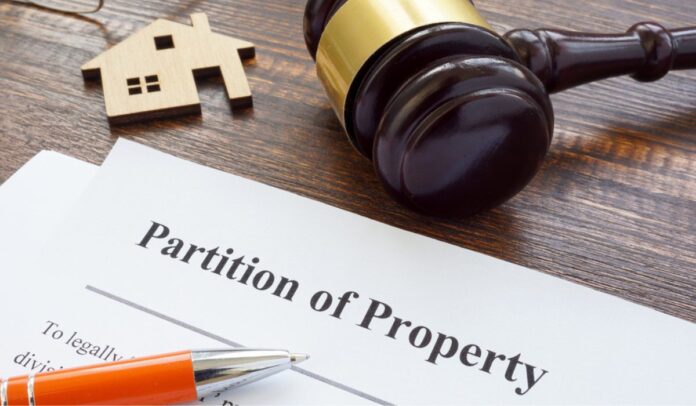
Owning property with others can get complicated. When disagreements arise, a partition lawsuit may be the solution. This legal step helps co-owners resolve conflicts and divide it fairly.
From forced sales to life changes, there are many reasons for filing. Understanding these reasons can help you know when and why a partition lawsuit might be needed.
1. Co-Owner Disagreement
One of the main reasons for filing a partition lawsuit is co-owner disagreement. When a property is owned by multiple people, opinions can differ on how to use or maintain it. A lawsuit may be the only way to find a fair solution when co-owners cannot agree.
In some cases, one co-owner might want to sell, while the other prefers to keep the property. This disagreement can lead to serious tension and frustration for everyone involved. Filing a lawsuit gives both parties a chance to resolve the dispute through the legal system.
If co-owners cannot resolve their differences, a judge will decide what is fair. This might involve selling the property and dividing the proceeds.

2. Forced Sale
Another reason for filing a lawsuit is a forced sale. This happens when one or more co-owners want to sell the property, but the others do not. The court can step in to make sure everyone’s interests are considered.
When one owner insists on selling, it can be hard for others to stop the process. The court may order a forced sale to prevent disagreements from getting worse. This solution ensures that everyone has a fair share in the sale of the property.
A forced sale is often a last resort, but it can help co-owners move forward. It ends ownership disputes by converting the real estate into cash. This cash is then divided, letting each person use their share as they wish.
3. Property Dispute
A property dispute often leads to a lawsuit when owners cannot agree on boundaries or use. Different ideas about property usage, like renting or improving the land, can create conflicts. Filing a partition lawsuit may be necessary to settle the disagreement in court.
Disputes may arise when owners have different visions for the property. For example, one person may want to build on the land, while the other wants it left as is. These disputes make it hard for co-owners to enjoy or benefit from their property fully.
A lawsuit can help clarify each person’s rights to the property. The court’s decision can establish fair rules, allowing each co-owner to understand their responsibilities.

4. Emotional Tensions
Owning property with others can sometimes create emotional tensions. Personal relationships, like those between family members, can make shared ownership complicated. Emotional stress can make co-owners feel that filing a lawsuit is the only way to find peace.
Emotional issues often arise when family members inherit it together. Differing opinions and feelings about it can cause resentment. A partition lawsuit can give everyone a fresh start by resolving the matter legally and fairly.
Resolving emotional tensions through a lawsuit allows for an objective solution. The court’s involvement can ease personal conflicts by focusing on fairness.
5. Life Events
Major life events, like marriage, divorce, or relocation, can also lead to filing a lawsuit. When someone’s life changes, they may want to use or sell the property differently. A partition lawsuit allows people to adapt to their new circumstances without forcing others to agree.
For instance, if one co-owner moves far away, they may no longer want to manage the property. In other cases, a divorce may require that property be divided between former spouses. Filing a lawsuit helps owners adjust property rights in a way that fits their new lives.
A lawsuit ensures that each co-owner’s situation is respected. By dividing or selling the property, everyone involved can move forward comfortably.

6. Investment Goals
Sometimes, co-owners disagree about investment goals for the property. One person might see the property as a long-term investment, while the other wants quick returns. A partition lawsuit can help align these differing goals by allowing each person to pursue their preferences.
Investors often buy property together, hoping to profit. However, conflicting goals can create tension when one wants to hold onto the property while the other wishes to sell. In these cases, a partition lawsuit can break the deadlock.
The court can order a fair solution that respects each co-owner’s investment needs. This may involve selling the property or dividing it, so each person can choose their investment path.
7. Inheritance Disputes
When family members inherit property together, disagreements can arise. Some heirs may want to sell it, while others prefer to keep it. A partition lawsuit provides a fair way to handle these conflicting wishes.
Inherited property can be a sensitive issue, especially if emotions are involved. One family member may see the property as a legacy, while another may see it as an asset to sell. When relatives disagree, a partition lawsuit can help settle the matter fairly.
A partition lawsuit allows each heir to share their opinion in court. The judge can determine the best course of action, such as dividing or selling the property. If you are facing such issues, you can visit a Sacramento partition lawyer to understand your options. They offer guidance through the legal process, making it less stressful for everyone involved.

8. Unequal Contributions
If co-owners contribute differently to property upkeep and expenses, a partition lawsuit can help. Differences in financial contributions can lead to disputes over ownership and rights. A lawsuit can help co-owners find a fair way to split or manage the property.
In some cases, one owner might pay for repairs or maintenance while the other does not. This can cause resentment and demands for a more balanced arrangement. Filing a partition lawsuit can address these financial differences legally.
The court can decide how to divide ownership based on contributions. A partition lawsuit helps resolve unfair situations by clarifying each person’s share.
Resolving Co-Ownership Conflicts With a Partition Lawsuit
A partition lawsuit helps co-owners resolve their differences over the property. Whether it’s a forced sale, inheritance dispute, or co-owner disagreement, these lawsuits offer a fair solution. By understanding these reasons, co-owners can make informed choices and maintain positive relationships.
When conflicts arise, partition lawsuits provide a path to resolution. They ensure that each person’s rights are respected and offer a clear way to divide property. Knowing your rights and options can make property ownership smoother for everyone involved.
Did you find this article helpful? Visit more of our blogs.





